人教版(2019)必修二:Unit 5 Music Discovering Useful Structures 强化一练(含答案)
文档属性
| 名称 | 人教版(2019)必修二:Unit 5 Music Discovering Useful Structures 强化一练(含答案) | 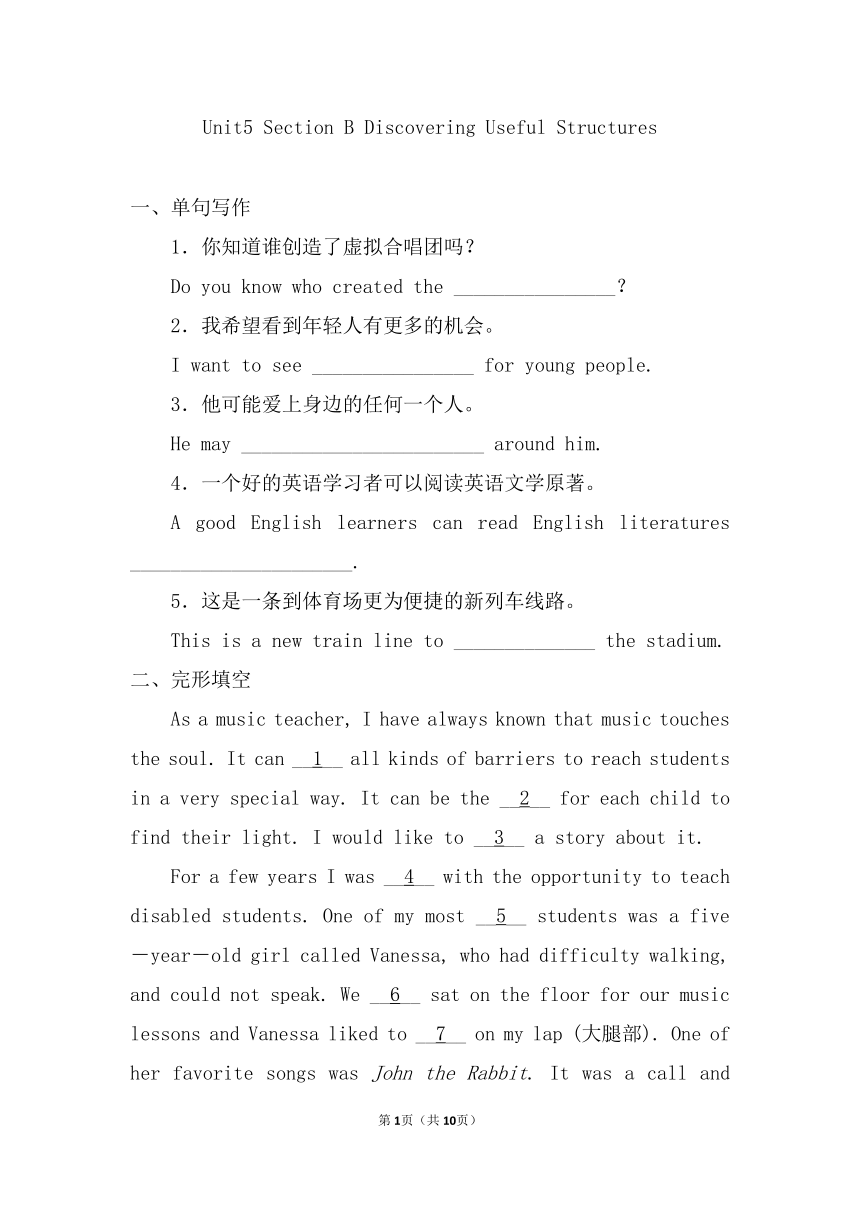 | |
| 格式 | doc | ||
| 文件大小 | 184.0KB | ||
| 资源类型 | 教案 | ||
| 版本资源 | 人教版(2019) | ||
| 科目 | 英语 | ||
| 更新时间 | 2021-11-05 10:18:56 | ||
图片预览

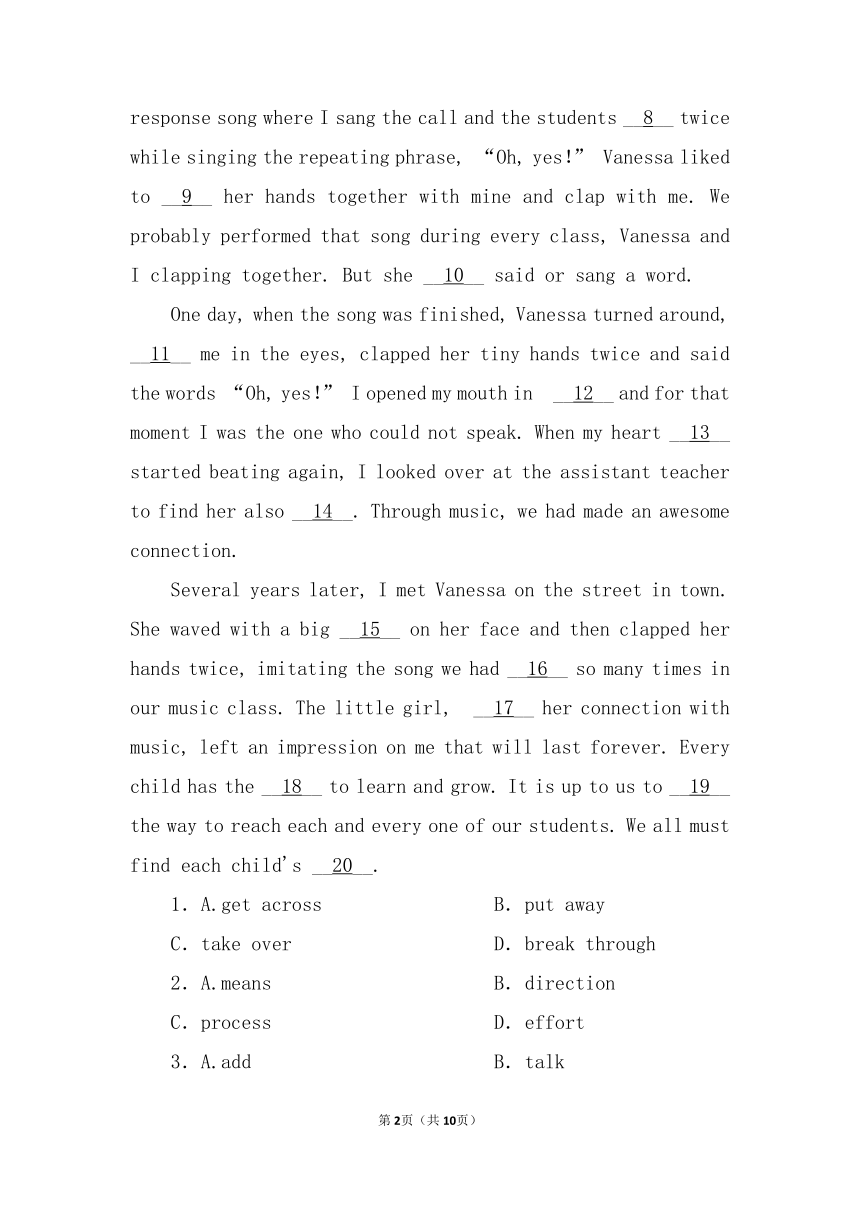
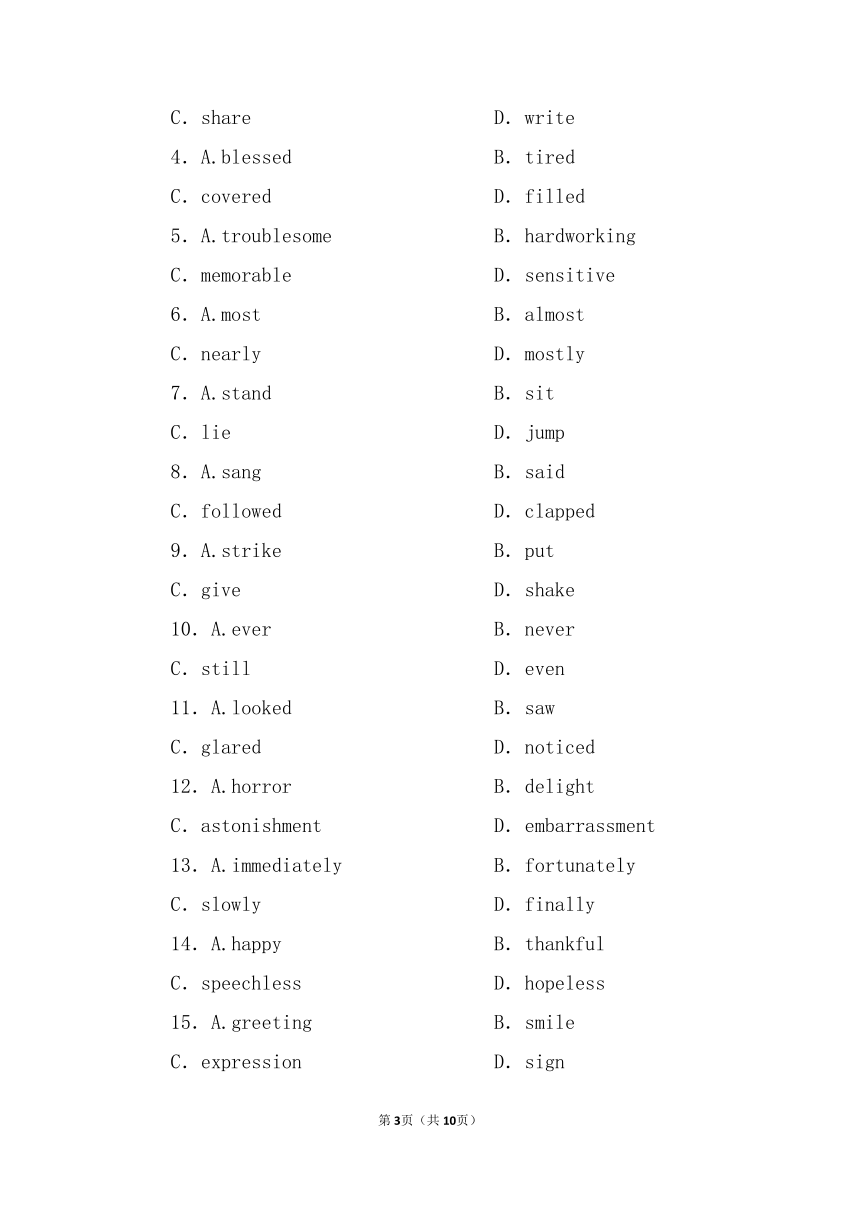
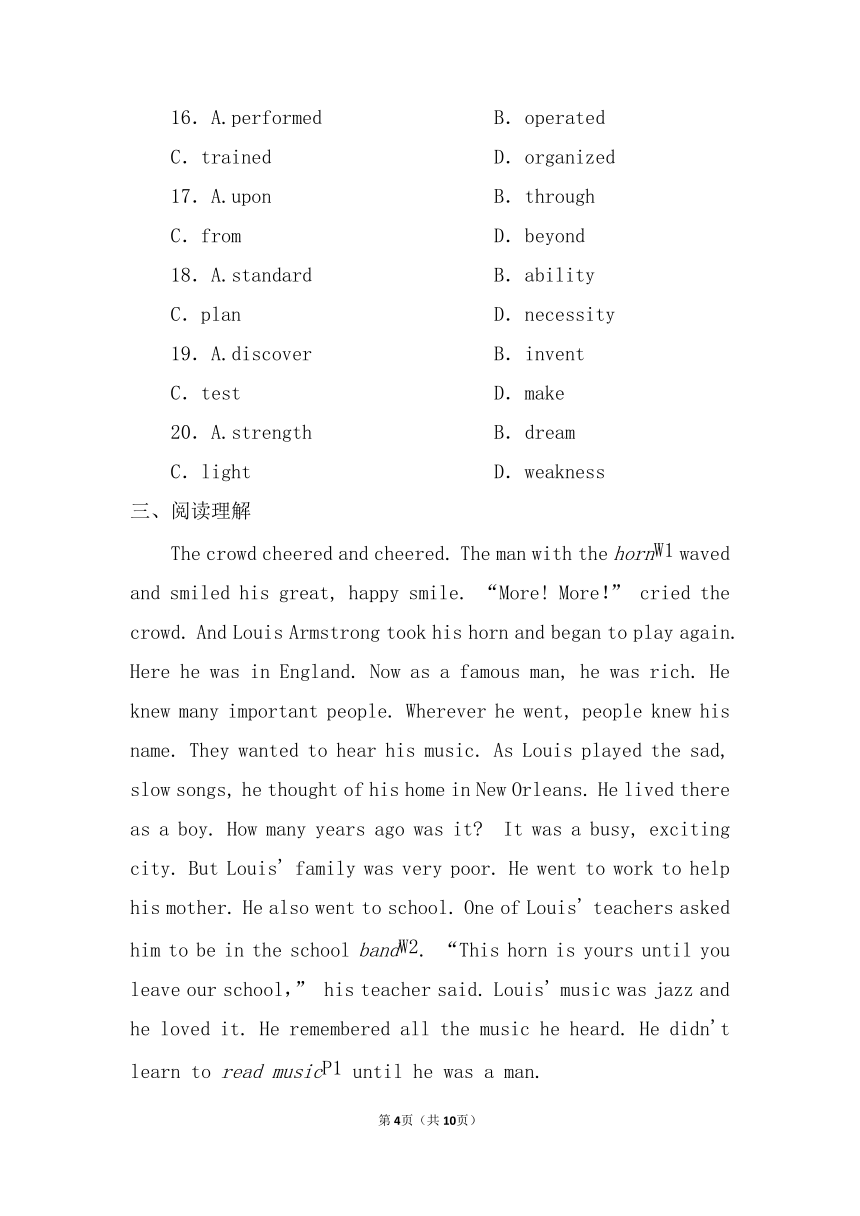
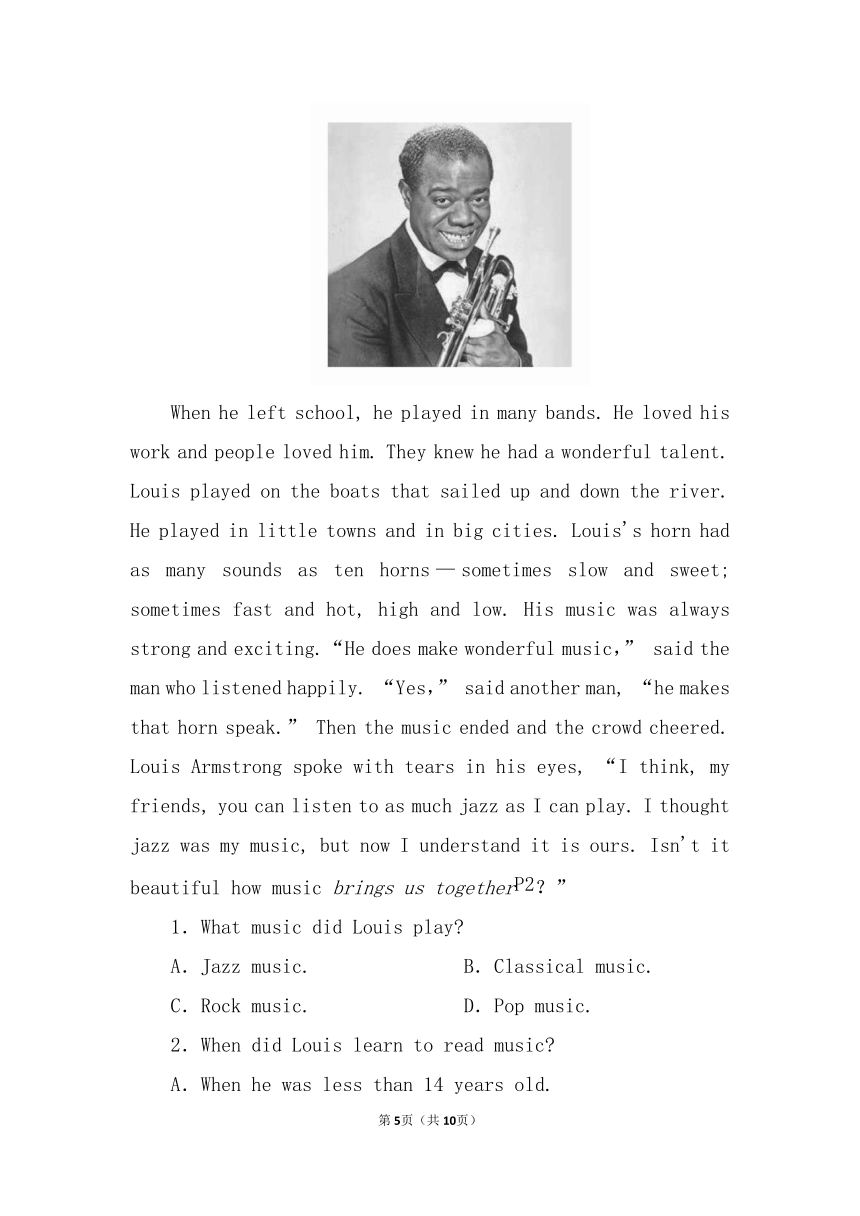
文档简介
Unit5 Section B Discovering Useful Structures
一、单句写作
1.你知道谁创造了虚拟合唱团吗?
Do you know who created the ________________?
2.我希望看到年轻人有更多的机会。
I want to see ________________ for young people.
3.他可能爱上身边的任何一个人。
He may ________________________ around him.
4.一个好的英语学习者可以阅读英语文学原著。
A good English learners can read English literatures ______________________.
5.这是一条到体育场更为便捷的新列车线路。
This is a new train line to ______________ the stadium.
二、完形填空
As a music teacher, I have always known that music touches the soul. It can __1__ all kinds of barriers to reach students in a very special way. It can be the __2__ for each child to find their light. I would like to __3__ a story about it.
For a few years I was __4__ with the opportunity to teach disabled students. One of my most __5__ students was a five-year-old girl called Vanessa, who had difficulty walking, and could not speak. We __6__ sat on the floor for our music lessons and Vanessa liked to __7__ on my lap (大腿部). One of her favorite songs was John the Rabbit. It was a call and response song where I sang the call and the students __8__ twice while singing the repeating phrase, “Oh, yes!” Vanessa liked to __9__ her hands together with mine and clap with me. We probably performed that song during every class, Vanessa and I clapping together. But she __10__ said or sang a word.
One day, when the song was finished, Vanessa turned around, __11__ me in the eyes, clapped her tiny hands twice and said the words “Oh, yes!” I opened my mouth in __12__ and for that moment I was the one who could not speak. When my heart __13__ started beating again, I looked over at the assistant teacher to find her also __14__. Through music, we had made an awesome connection.
Several years later, I met Vanessa on the street in town. She waved with a big __15__ on her face and then clapped her hands twice, imitating the song we had __16__ so many times in our music class. The little girl, __17__ her connection with music, left an impression on me that will last forever. Every child has the __18__ to learn and grow. It is up to us to __19__ the way to reach each and every one of our students. We all must find each child's __20__.
1.A.get across B.put away
C.take over D.break through
2.A.means B.direction
C.process D.effort
3.A.add B.talk
C.share D.write
4.A.blessed B.tired
C.covered D.filled
5.A.troublesome B.hardworking
C.memorable D.sensitive
6.A.most B.almost
C.nearly D.mostly
7.A.stand B.sit
C.lie D.jump
8.A.sang B.said
C.followed D.clapped
9.A.strike B.put
C.give D.shake
10.A.ever B.never
C.still D.even
11.A.looked B.saw
C.glared D.noticed
12.A.horror B.delight
C.astonishment D.embarrassment
13.A.immediately B.fortunately
C.slowly D.finally
14.A.happy B.thankful
C.speechless D.hopeless
15.A.greeting B.smile
C.expression D.sign
16.A.performed B.operated
C.trained D.organized
17.A.upon B.through
C.from D.beyond
18.A.standard B.ability
C.plan D.necessity
19.A.discover B.invent
C.test D.make
20.A.strength B.dream
C.light D.weakness
三、阅读理解
The crowd cheered and cheered. The man with the horn waved and smiled his great, happy smile. “More! More!” cried the crowd. And Louis Armstrong took his horn and began to play again. Here he was in England. Now as a famous man, he was rich. He knew many important people. Wherever he went, people knew his name. They wanted to hear his music. As Louis played the sad, slow songs, he thought of his home in New Orleans. He lived there as a boy. How many years ago was it It was a busy, exciting city. But Louis' family was very poor. He went to work to help his mother. He also went to school. One of Louis' teachers asked him to be in the school band. “This horn is yours until you leave our school,” his teacher said. Louis' music was jazz and he loved it. He remembered all the music he heard. He didn't learn to read music until he was a man.
When he left school, he played in many bands. He loved his work and people loved him. They knew he had a wonderful talent. Louis played on the boats that sailed up and down the river. He played in little towns and in big cities. Louis's horn had as many sounds as ten horns—sometimes slow and sweet; sometimes fast and hot, high and low. His music was always strong and exciting.“He does make wonderful music,” said the man who listened happily. “Yes,” said another man, “he makes that horn speak.” Then the music ended and the crowd cheered. Louis Armstrong spoke with tears in his eyes, “I think, my friends, you can listen to as much jazz as I can play. I thought jazz was my music, but now I understand it is ours. Isn't it beautiful how music brings us together?”
1.What music did Louis play
A.Jazz music. B.Classical music.
C.Rock music. D.Pop music.
2.When did Louis learn to read music
A.When he was less than 14 years old.
B.When he was in the school band.
C.After he became a grown up.
D.After he went to school.
3.What was Louis Armstrong most famous for
A.His great happy smile.
B.His sad and slow songs.
C.His wonderful jazz music.
D.His beautiful speech.
4.Which of the following is the best title for this text
A.Musician B.A Beautiful Horn
C.Sweet Smiles D.The Man with the Horn
一、单句写作
1.virtual choir
2.more opportunities
3.fall in love with anyone
4.in the original
5.enable easier access to
二、完形填空
1.D get across “被理解;把……讲清楚”;put away “将……收起;储存”;take over “接管;控制”;break through “突破;克服(障碍等)”。此处是说音乐能用一种特殊的方式突破各种障碍直击学生的心灵,故选D。
2.A 通过这一途径(means),可以让每个孩子找到自己的亮光,故选A。
3.C “我”想和大家分享(share)一个故事,故选C。
4.A 在过去的一些年中,我有幸有机会教残疾孩子,be blessed with “有幸得到……;享有……的”,故选A。
5.C 其中我最难忘的是一个五岁的孩子,memorable “难忘的,值得纪念的”。故选C。
6.D most “最”;almost “几乎”;nearly “将近”;mostly “主要地,通常”。我们通常坐在地板上上音乐课,故选D。
7.B 联系上文“who had difficulty walking”可知这个小女孩是坐(sit)在我的大腿上的,故选B。
8.D 从下文“clap with me”可知此处指学生拍(clapped)两次手,故选D。
9.B Vanessa喜欢把她的手和“我”的手放(put)在一起,然后和“我”一起拍手,故选B。
10.B 根据上文中的“could not speak”可知,但她从来不(never)说也不唱一个字,故选B。
11.A look “看”; see “看见”; glare “瞪眼”;notice “注意”。Vanessa转过身,直视着我的眼睛。look sb. in the eye “直视某人的眼睛”,故选A。
12.C horror “恐惧”;delight “高兴”;astonishment “吃惊”;embarrassment “尴尬”。根据语境可知,“我”非常吃惊地张大了嘴,故选C。
13.D 因吃惊忘了呼吸,忘了心跳,但并不是不呼吸,不心跳了,而是最终回过神来了,所以不能用slowly,而用finally。故选D。
14.C “我”看着那个助理教师,发现她也惊讶得说不出话来了。speechless “(尤指气得或惊讶得)说不出话的”,故选C。
15.B 她面带微笑(smile),向“我”招手。故选B。
16.A 模仿我们在音乐课上表演了(performed)很多次的那首歌,故选A。
17.B 根据上文中的“Through music, we had made an awesome connection.”可知,这个小女孩通过(through)她和音乐的联系,给我留下了深刻的印象,故选B。
18.B 每个孩子都有学习和成长的能力(ability),故选B。
19.A 得靠我们去发现(discover)通往学生心灵的道路,故选A。
20.C 我们都必须找到每个孩子的亮光,本句和第一段中的“It can be ... find their light.”相照应,故选C。
三、阅读理解
1.A 细节理解题。根据第一段倒数第三句可知他演奏的是爵士乐。
2.C 细节理解题。根据第一段最后一句可知直到成年他才学会识乐谱。
3.C 细节理解题。纵观全文可知,Louis是以爵士乐而出名的。故选C。
4.D 标题判断题。根据本文主题以及第一段中的“The man with the horn waved and smiled his great, happy smile.”和第二段中的“he makes that horn speak”可知,本文主要突出了音乐家和他的乐器,故D项正确。
第9页(共10页)
一、单句写作
1.你知道谁创造了虚拟合唱团吗?
Do you know who created the ________________?
2.我希望看到年轻人有更多的机会。
I want to see ________________ for young people.
3.他可能爱上身边的任何一个人。
He may ________________________ around him.
4.一个好的英语学习者可以阅读英语文学原著。
A good English learners can read English literatures ______________________.
5.这是一条到体育场更为便捷的新列车线路。
This is a new train line to ______________ the stadium.
二、完形填空
As a music teacher, I have always known that music touches the soul. It can __1__ all kinds of barriers to reach students in a very special way. It can be the __2__ for each child to find their light. I would like to __3__ a story about it.
For a few years I was __4__ with the opportunity to teach disabled students. One of my most __5__ students was a five-year-old girl called Vanessa, who had difficulty walking, and could not speak. We __6__ sat on the floor for our music lessons and Vanessa liked to __7__ on my lap (大腿部). One of her favorite songs was John the Rabbit. It was a call and response song where I sang the call and the students __8__ twice while singing the repeating phrase, “Oh, yes!” Vanessa liked to __9__ her hands together with mine and clap with me. We probably performed that song during every class, Vanessa and I clapping together. But she __10__ said or sang a word.
One day, when the song was finished, Vanessa turned around, __11__ me in the eyes, clapped her tiny hands twice and said the words “Oh, yes!” I opened my mouth in __12__ and for that moment I was the one who could not speak. When my heart __13__ started beating again, I looked over at the assistant teacher to find her also __14__. Through music, we had made an awesome connection.
Several years later, I met Vanessa on the street in town. She waved with a big __15__ on her face and then clapped her hands twice, imitating the song we had __16__ so many times in our music class. The little girl, __17__ her connection with music, left an impression on me that will last forever. Every child has the __18__ to learn and grow. It is up to us to __19__ the way to reach each and every one of our students. We all must find each child's __20__.
1.A.get across B.put away
C.take over D.break through
2.A.means B.direction
C.process D.effort
3.A.add B.talk
C.share D.write
4.A.blessed B.tired
C.covered D.filled
5.A.troublesome B.hardworking
C.memorable D.sensitive
6.A.most B.almost
C.nearly D.mostly
7.A.stand B.sit
C.lie D.jump
8.A.sang B.said
C.followed D.clapped
9.A.strike B.put
C.give D.shake
10.A.ever B.never
C.still D.even
11.A.looked B.saw
C.glared D.noticed
12.A.horror B.delight
C.astonishment D.embarrassment
13.A.immediately B.fortunately
C.slowly D.finally
14.A.happy B.thankful
C.speechless D.hopeless
15.A.greeting B.smile
C.expression D.sign
16.A.performed B.operated
C.trained D.organized
17.A.upon B.through
C.from D.beyond
18.A.standard B.ability
C.plan D.necessity
19.A.discover B.invent
C.test D.make
20.A.strength B.dream
C.light D.weakness
三、阅读理解
The crowd cheered and cheered. The man with the horn waved and smiled his great, happy smile. “More! More!” cried the crowd. And Louis Armstrong took his horn and began to play again. Here he was in England. Now as a famous man, he was rich. He knew many important people. Wherever he went, people knew his name. They wanted to hear his music. As Louis played the sad, slow songs, he thought of his home in New Orleans. He lived there as a boy. How many years ago was it It was a busy, exciting city. But Louis' family was very poor. He went to work to help his mother. He also went to school. One of Louis' teachers asked him to be in the school band. “This horn is yours until you leave our school,” his teacher said. Louis' music was jazz and he loved it. He remembered all the music he heard. He didn't learn to read music until he was a man.
When he left school, he played in many bands. He loved his work and people loved him. They knew he had a wonderful talent. Louis played on the boats that sailed up and down the river. He played in little towns and in big cities. Louis's horn had as many sounds as ten horns—sometimes slow and sweet; sometimes fast and hot, high and low. His music was always strong and exciting.“He does make wonderful music,” said the man who listened happily. “Yes,” said another man, “he makes that horn speak.” Then the music ended and the crowd cheered. Louis Armstrong spoke with tears in his eyes, “I think, my friends, you can listen to as much jazz as I can play. I thought jazz was my music, but now I understand it is ours. Isn't it beautiful how music brings us together?”
1.What music did Louis play
A.Jazz music. B.Classical music.
C.Rock music. D.Pop music.
2.When did Louis learn to read music
A.When he was less than 14 years old.
B.When he was in the school band.
C.After he became a grown up.
D.After he went to school.
3.What was Louis Armstrong most famous for
A.His great happy smile.
B.His sad and slow songs.
C.His wonderful jazz music.
D.His beautiful speech.
4.Which of the following is the best title for this text
A.Musician B.A Beautiful Horn
C.Sweet Smiles D.The Man with the Horn
一、单句写作
1.virtual choir
2.more opportunities
3.fall in love with anyone
4.in the original
5.enable easier access to
二、完形填空
1.D get across “被理解;把……讲清楚”;put away “将……收起;储存”;take over “接管;控制”;break through “突破;克服(障碍等)”。此处是说音乐能用一种特殊的方式突破各种障碍直击学生的心灵,故选D。
2.A 通过这一途径(means),可以让每个孩子找到自己的亮光,故选A。
3.C “我”想和大家分享(share)一个故事,故选C。
4.A 在过去的一些年中,我有幸有机会教残疾孩子,be blessed with “有幸得到……;享有……的”,故选A。
5.C 其中我最难忘的是一个五岁的孩子,memorable “难忘的,值得纪念的”。故选C。
6.D most “最”;almost “几乎”;nearly “将近”;mostly “主要地,通常”。我们通常坐在地板上上音乐课,故选D。
7.B 联系上文“who had difficulty walking”可知这个小女孩是坐(sit)在我的大腿上的,故选B。
8.D 从下文“clap with me”可知此处指学生拍(clapped)两次手,故选D。
9.B Vanessa喜欢把她的手和“我”的手放(put)在一起,然后和“我”一起拍手,故选B。
10.B 根据上文中的“could not speak”可知,但她从来不(never)说也不唱一个字,故选B。
11.A look “看”; see “看见”; glare “瞪眼”;notice “注意”。Vanessa转过身,直视着我的眼睛。look sb. in the eye “直视某人的眼睛”,故选A。
12.C horror “恐惧”;delight “高兴”;astonishment “吃惊”;embarrassment “尴尬”。根据语境可知,“我”非常吃惊地张大了嘴,故选C。
13.D 因吃惊忘了呼吸,忘了心跳,但并不是不呼吸,不心跳了,而是最终回过神来了,所以不能用slowly,而用finally。故选D。
14.C “我”看着那个助理教师,发现她也惊讶得说不出话来了。speechless “(尤指气得或惊讶得)说不出话的”,故选C。
15.B 她面带微笑(smile),向“我”招手。故选B。
16.A 模仿我们在音乐课上表演了(performed)很多次的那首歌,故选A。
17.B 根据上文中的“Through music, we had made an awesome connection.”可知,这个小女孩通过(through)她和音乐的联系,给我留下了深刻的印象,故选B。
18.B 每个孩子都有学习和成长的能力(ability),故选B。
19.A 得靠我们去发现(discover)通往学生心灵的道路,故选A。
20.C 我们都必须找到每个孩子的亮光,本句和第一段中的“It can be ... find their light.”相照应,故选C。
三、阅读理解
1.A 细节理解题。根据第一段倒数第三句可知他演奏的是爵士乐。
2.C 细节理解题。根据第一段最后一句可知直到成年他才学会识乐谱。
3.C 细节理解题。纵观全文可知,Louis是以爵士乐而出名的。故选C。
4.D 标题判断题。根据本文主题以及第一段中的“The man with the horn waved and smiled his great, happy smile.”和第二段中的“he makes that horn speak”可知,本文主要突出了音乐家和他的乐器,故D项正确。
第9页(共10页)
